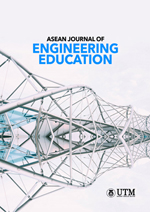Flipping the Classroom to Improve Academic Achievement of Information Systems Students with the Support of Learning Management System (LMS)
DOI:
https://doi.org/10.11113/ajee2020.4n2.6Keywords:
Flipped classroom, flipped learning approachAbstract
This study aims to explore the effects of flipped classroom implementation on students’ academic achievement. Three courses that was offered to Information System students implemented the flipped classroom approach with the support of ULearn Learning Management System (LMS) over twelve (12) weeks of learning. Students’ coursework assessments and examination scores were compared between controlled groups that employed traditional teaching
approach and experimental groups which introduced the flipped learning approach. The Mann-Whitney test was used to compare the median and mean total marks of the two learning approaches, as well as data consistency for the mean total marks. Results show that median and mean total marks were higher in experimental group when compared to the control group for Knowledge Management System (KMS) and Information System Strategy & Planning (ISP)
courses. This is proof that flipped classroom approach is a potential student-centred learning approach that can improve students’ academic achievement by encouraging students to be deep learners and promoting self-directed learning and life-long learning through the time optimization of out-class lectures and in-class active and collaborative learning activities.


















